Self-Employment Activities of Women and Minorities: Their Success or Failure in Relation to Social Citizenship Policies
Editat de Ursula Apitzsch, Maria Kontosen Limba Engleză Paperback – 27 noi 2007
Preț: 383.33 lei
Nou
Puncte Express: 575
Preț estimativ în valută:
73.35€ • 79.93$ • 61.81£
73.35€ • 79.93$ • 61.81£
Carte tipărită la comandă
Livrare economică 23 aprilie-07 mai
Preluare comenzi: 021 569.72.76
Specificații
ISBN-13: 9783810034489
ISBN-10: 3810034487
Pagini: 220
Ilustrații: VI, 218 p.
Dimensiuni: 148 x 210 x 14 mm
Greutate: 0.3 kg
Ediția:2008
Editura: VS Verlag für Sozialwissenschaften
Colecția VS Verlag für Sozialwissenschaften
Locul publicării:Wiesbaden, Germany
ISBN-10: 3810034487
Pagini: 220
Ilustrații: VI, 218 p.
Dimensiuni: 148 x 210 x 14 mm
Greutate: 0.3 kg
Ediția:2008
Editura: VS Verlag für Sozialwissenschaften
Colecția VS Verlag für Sozialwissenschaften
Locul publicării:Wiesbaden, Germany
Public țintă
ResearchCuprins
Methods and contexts.- Social exclusion and self-employment in European societies: An introduction.- The method of biographical policy evaluation.- Socio-economic contexts of self-employment.- Arenas of policy making.- Dimensions of European diversity in non-priviledged self-employment.- The biographical embeddedness of women’s self-employment. Motivations, strategies and policies.- Self-employment, autonomy and empowerment against patriarchal family structures.- Clientelism and family spirit. Some notes on self-employment policy in Calabria.- Gender, the family and self-employment: Is the family a resource for migrant women entrepreneurs?.- Collective self-employment of migrant women in Sweden. Biographical projects and policy measures.- Gendered professional strategies in self-employment.- Migrant men and the challenge of entrepreneurial creativity.- Highly educated and/or skilled migrants from third countries and self-employment in Greece: a comparison between men’s and women’s experiences.- Pontian newcomers in Greece.- Some conclusions.
Notă biografică
Dr. Ursula Apitzsch is Professor of Sociology and Political Science at J.W. Goethe-University, Frankfurt/Main.
Dr. Maria Kontos is researcher at the Frankfurt Institute of Social Research.
Dr. Maria Kontos is researcher at the Frankfurt Institute of Social Research.
Textul de pe ultima copertă
The discussion on new forms of non-privileged self-employment of women and minorities is usually divided into separate discourses on women’s opportunities on the one hand and ethnic business on the other. The focus in the discussion about the special resources of migrant entrepreneurship has been above all on the assumed collective traditions of ethnic business and not on the individual emancipative resources of the self-employed. This book has brought the two discourses together. While women and migrants are most vulnerable to social exclusion on the labour market, at the same time they are subjects of unrecognized resources for self-employment that have to be taken into account under the special conditions of social citizenship policies in the European Union.
Caracteristici
Success or Failure?



















